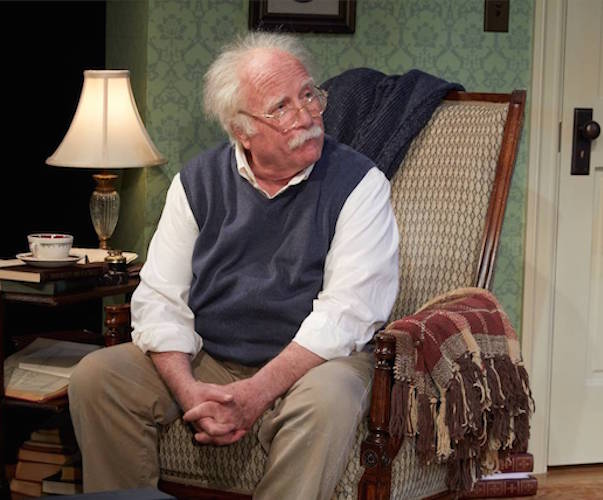
There are few sure things in American theater, but dramatist Mark St. Germain is one of them. For the past two years he has been included on the New York Times list of most- produced homegrown playwrights, and theaters are lining up to stage his latest play, Relativity. The script was commissioned by the Florida Studio Theater, where it premiered in August. Productions are scheduled for Iowa and Illinois and others in the works. Closer to home, the drama is opening TheaterWorks’ 31st season in a production that stars veteran actor Richard Dreyfuss as Albert Einstein. The performer’s marquee appeal has guaranteed a sold-out run as well as an extension. The script is generally well-crafted, taut, and insightful, aptly directed by Rob Ruggiero, who is the artistic director of the company. The production values (designed by the estimable Brian Prather) are superb; the highlight is an evocative, cozy set, the American home/office of Einstein. The room has many impressive period touches, including a window from which the renowned scientist gazes out at the FBI agents who keep watch and pick through his trash for incriminating documents. Why the spy business? The play evokes the paranoia that surrounded Einstein (1879-1955), who left Germany for America in 1933. He joined the Institute for Advanced Study at Princeton University and lived there for the remaining 22 years of his life. We learn that during the McCarthy era he was suspected of being a communist. What else could J. Edgar Hoover possibly conclude, given that the eccentric genius publicly avowed pacifism and deplored racism? Besides that, Einstein was on-record as being conflicted, intellectually and emotionally, about the nuclear age and his responsibility for its destructive potential. (Ground well covered in Terry Johnson’s play Insignificance.) The focus of Mark St. Germain’s drama is not Cold War politics, but exploring the question of whether a great man is (or need be) a good man. We first encounter Dreyfuss coyly shaping a cuddly, genially weird marketing image of himself for public consumption. He bows to the populist need to humanize men of genius, to domesticate innovative thinkers whose ideas threaten conventional beliefs. Of course, in the depths of his heart, St. Germain’s Einstein is a man who doesn’t like to be with other people. His radically asocial self is revealed during a disturbing visit by a self-proclaimed reporter, Margaret Harding (Christa Scott-Reed). At first, Einstein is accessible and charming, an amusing figure who tells jokes to a parrot in a covered cage. But the easy banter grows darker as the reporter asks ever more probing and personal questions. She reads him quotations from her research as well as excerpts from numerous interviews. Einstein bridles at this, and asks “Is this an interview or an interrogation?” The intensity of the encounter ratchets up when we learn that the reporter may indeed be the abandoned daughter Einstein fathered with his abused first wife, Mileva Mari Einstein. She gave birth in 1902 at home with her family and he never saw the child. Researchers differ on what became of the baby after 1904 — there is speculation she may have died of scarlet fever. The ensuing battle of disclosure and obfuscation (the relativity of memory and morality?) stands with St. Germain’s best work. That said, there are problems with the set-up, more than a fuzzy touch of contrivance. For example, there is the matter of motive. Why has Margaret made such an effort to research and confront Einstein? He asks, quite reasonably — what does she want from him? She reveals that her son is a prodigy with an IQ of 190. He has earned early admission to Princeton, but she refuses to have him meet his “grandfather.” Is this protection for her son or punishment of the father who abandoned her? What part does revenge play in the hypothetical meeting? The TheaterWorks production has a few problems, as well. Dreyfuss is a remarkably skilled actor and provides a credible portrait with adept gestures and a convincing German inflected accent. But the dynamic of his responses to the increasingly sharp probing of Scott-Reed is rather flat, failing to generate much suspense or psychological depth. The arc of his unmasking lacks precision. Part of the theatrical disconnect is due to the casting. Dreyfuss’s Einstein is short, disheveled (with that signature wild hair) and vulnerable. His alleged daughter towers over him. That presents a visual mismatch that undercuts what should be a gripping tug-of-war. The third person in the drama is Einstein’s housekeeper Helen Dukas (Lori Wilner). She was devoted to his every need after Elsa (his cousin and second wife) died in 1936. There is some implied intimacy but no obvious affection between them. He habitually needed a woman who provided household service — as well as “services” — with no expectations. We hear about the requirements he demanded from Margaret’s mother: he gave Mileva a list of rules some time after she married him. If she wanted to remain with him, she could not talk to him. She was to leave three meals a day in his study. She was never to criticize him, and he could sleep with somebody else two nights a week. Margaret alleges that Mileva played a valuable role in his early research. (There is evidence that this is true.) Einstein argues back that, as he wrote in a letter to a friend, “She wants one thing out of life and that’s to be Mrs. Albert Einstein.” From the beginning of their relationship she called him “The Great Man.” Margaret charges that in his private life Einstein was a “monster.” Helen, who became his sole heir (disinheriting sons Hans and Eduard), responds that he is a “good man.” Einstein’s ideas transformed the world, but he was a philanderer, misogynist, and misanthrope who confessed that “Every human relationship I have is a chain around my neck.” St. Germain’s play raises provocative questions about the high price paid by those who nurture genius.
